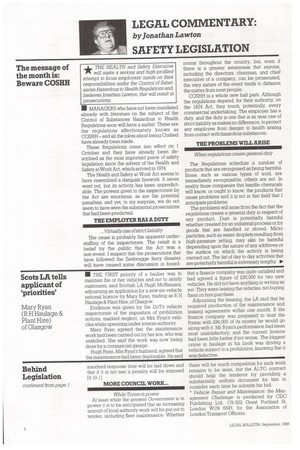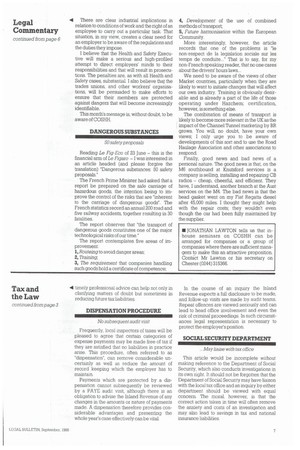LEGAL COMMENTARY:
Page 114

Page 115

If you've noticed an error in this article please click here to report it so we can fix it.
by Jonathan Lawton
SAFETY LEGISLATION
The message of the month is: Beware COSHH
"THE HEALTH and Safety Executive will make a serious and high-profiled attempt to focus employers' minds on their responsibilities under the Control of Substances Hazardous to Health Regulations and, believes Jonathan Lawton, that will result in prosecutions.
• MANAGERS who have not been inundated already with literature on the subject of the Control of Substances Hazardous to Health Regulations soon will have a surfeit. These are the regulations affectionately known as CQSHH— and all the jokes about being Coshed have already been made.
These Regulations come into effect on 1 October and they have already been described as the most important piece of safety legislation since the advent of the Health and Safety at Work Act, which arrived in 1974.
The Health and Safety at Work Act seems to have resembled a dampish firework. It never went out, but its activity has been unpredictable_ The powers given to the inspectorate by the Act are enormous, as are the potential penalties, and yet, to my surprise, we do not seem to have seen the substantial prosecutions that had been predicted.
THE EMPLOYER HAS A DUTY ...Virtually one of strict liability The cause is probably the apparent understaffing of the inspectorate. The result is a belief by the public that the Act was a non-event. I suspect that the prosecutions that have followed the Zeebrugge ferry disaster will have caused some discussion in board
rooms throughout the country, but, even if there is a greater awareness that anyone, including the directors, chairman, and chief executive of a company, can be prosecuted, the very nature of the event tends to distance the matter from most people.
COSHH is a whole new ball park. Although the regulations depend, for their authority, on the 1974 Act, they touch, potentially, every commercial undertaking. The employer has a duty, and the duty is one that is as near one of strict liability as makes no difference, to protect any employee from danger to health arising from contact with hazardous substances.
THE PROBLEMS WILL ARISE When regulations create general duty
The Regulations schedule a number of products that are recognised as being harmful. Some, such as various types of acid, are immediately recognisable, others are not. In reality those companies that handle chemicals will know, or ought to know, the products that cause problems and it is not in that field that I anticipate problems.
The problems will arise from the fact that the regulations create a general duty in respect of any product. Dust is potentially harmful whether created by an industrial process or by goods that are handled or stored. Micro particles, such as water droplets resulting from high-pressure jetting, may also be harmful depending upon the nature of any additives or the surface on which the activity is being carried out. The list of day to day activities that are potentially harmful is extremely lengthy. • • There are clear industrial implications in relation to conditions of work and the right of an employee to carry out a particular task. That situation, in my view, creates a clear need for an employer to be aware of the regulations and the duties they impose, I believe that the Health and Safety Executive will make a serious and high-profiled attempt to direct employers minds to their responsibilities and that will result in prosecutions. The penalties are, as with all Health and Safety cases, substantial. I also believe tha,t the trades unions, and other workers' organisations, will be persuaded to make efforts to ensure that their members are protected against dangers that will become increasingly identifiable.
This month's message is, without doubt, lobe aware of COSHH.
DANGEROUS SUBSTANCES SO safety proposals Reading Le Fig-Eco of 23 June this is the financial arm of Le Figaro -I was interested in an article headed (and please forgive the translation) "Dangerous substances: 50 safety proposals."
The French Prime Minister had asked that a report be prepared on the safe carriage of hazardous goods, the intention being to improve the control of the risks that are "inherent to the carriage of dangerous goods". The French statistics record an annual 200 road and five railway accidents, together resulting in 30 fatalities.
The report observes that "the transport of dangerous goods constitutes one of the major technological risks of our time."
The report contemplates five areas of improvement: 1, Routeing to avoid danger areas; 2, Training 3, The requirement that companies handling such goods hold a certificate of competence; 4, Development of the use of combined methods of transport; 5, Future harmonisation within the European Community.
More interestingly, however, the article records that one of the problems is "le non-respect de la legislation sociale sur les temps de conduite..." That is to say, for my non-French speaking reader, that no one cares about the drivers' hours laws...
We need to be aware of the views of other Market countries, particularly when they are likely to want to initiate changes that will affect our own industry. Training is obviously desirable and is already a part of the life of those operating under Hazchem; certification, however, is something else.
The combination of means of transport is likely to become more relevant in the UK as the impact of the Channel Tunnel marketing by BR grows. You will, no doubt, have your own views; I only urge you to be aware of developments of this sort and to use the Road Haulage Association and other associations to respond.
Finally, good news and bad news of a personal nature. The good news is that, on the M6 southbound at Knutsford services is a company is selling, installing and repairing CB radios cheap, cheerful, and efficient. They have, I understand, another branch at the Aust services on the M4. The bad news is that the head gasket went on my Fiat Regatta diesel after 45,000 miles. I thought they might help with the repair costs; they wouldn't even though the car had been fully maintained by the supplier.
• JONATHAN LAWTON tells us that inhouse seminars on COSHH can be arranged for companies or a group of companies where there are sufficient managers to make this an attractive proposition. Contact Mr Lawton or his secretary on Chester (0244) 315366.




















































































































